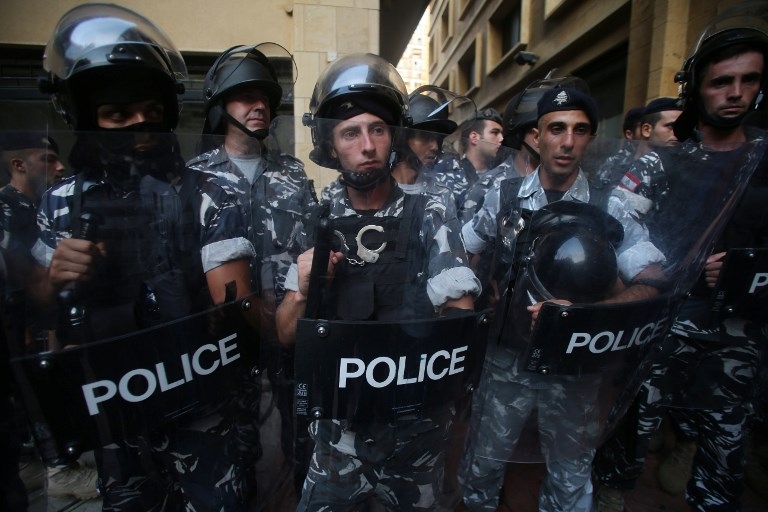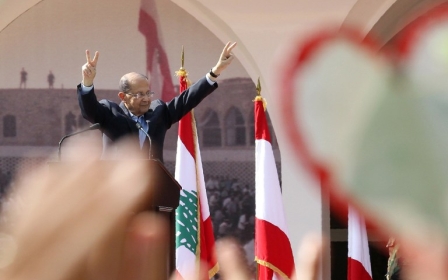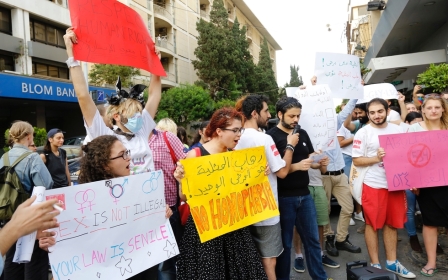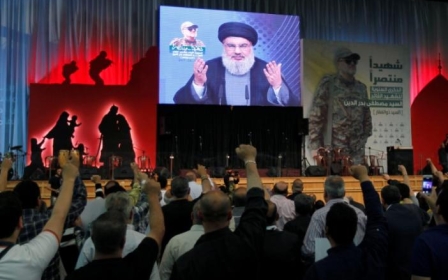Lebanese protesters beaten by soldiers in election law protest

At least seven people were injured in Beirut on Friday as Lebanese security personnel used batons and sticks to break up a demonstration against a new electoral law introduced earlier this week, eyewitnesses reported.
Demonstrators had organised in front of the parliamentary building in the Lebanese capital to protest an agreement reached on Tuesday between Lebanon’s rival parties paving the way for an eventual parliamentary election.
“We were treated with unprecedented brutality just for trying to defend our basic rights,” Lucien Bourjeily, one of the protest organisers and a Youstink activist told Middle East Eye.
The Youstink movement, a civil group originally established to protest Lebanon's rubbish crisis, has organised many protests since its establishment in 2015. The movement was accused by the government of forming gang riots and causing civil disruption.
A video that was circulated over social media showed two women among the protests brutally beaten by soldiers.
According to Bourjeli, the demonstrators were attacked by the security personnel when they started throwing eggs at MPs' cars as they drove through the gates of the parliament’s complex.
The women, identified as Youstink activists Nada Nasif and Rita Hanna, were treated for their wounds on site, Bourjeili told MEE.
According to Beirut-based journalist Kareem Chehayeb, the incident was sparked by protesters attempting to enter Najmeh Square, where the Lebanese parliament is based.
"All the small streets leading to the square are usually barred by security forces. Whenever there's a protests, they seal those streets shut," Chehayeb told MEE.
"The protesters wanted to show the opposition to the electoral law by entering Najmeh Square," said Chehayeb. "Despite not using any violence, security forces beat them up as they tried to walk into the square."
'Illegal extension'
Activists believe the new law is merely an extension of an illegal system currently in place.
“We were protesting the illegal extension of parliament for a fourth time and the postponing of the elections once again,”
“The elections should have happened by now,” added Bourjeily.
The agreement reached on Tuesday averted a crisis that had threatened to unravel the political deal that brought president Michel Aoun to office last year, more than two years after the previous president left.
“We are angry because the people in power do not represent us. The extension means denying us the right to choose our representatives and hold them accountable. The last time we had an elections was nine years ago,” explained Bourjeily.
Politicians have spent months wrangling over the new law and had a deadline of 20 June to pass it before parliament's term expired.
The country has never been without a parliament before, but the present parliament has extended its own term twice since 2009 because of fundamental disagreements between the parties.
Aoun and his allies say the way in which members of parliament are chosen in the existing system, and its drawing of electoral districts, gives Muslims too much say over which Christians are elected.
Their critics say the system has encouraged political alliances across sectarian lines.
The law does not implement previously proposed reforms, including a quota for women, allowing Lebanese army soldiers to vote and lowering the voting age from 21 to 18, according to Annahar.
New MEE newsletter: Jerusalem Dispatch
Sign up to get the latest insights and analysis on Israel-Palestine, alongside Turkey Unpacked and other MEE newsletters
Middle East Eye delivers independent and unrivalled coverage and analysis of the Middle East, North Africa and beyond. To learn more about republishing this content and the associated fees, please fill out this form. More about MEE can be found here.




